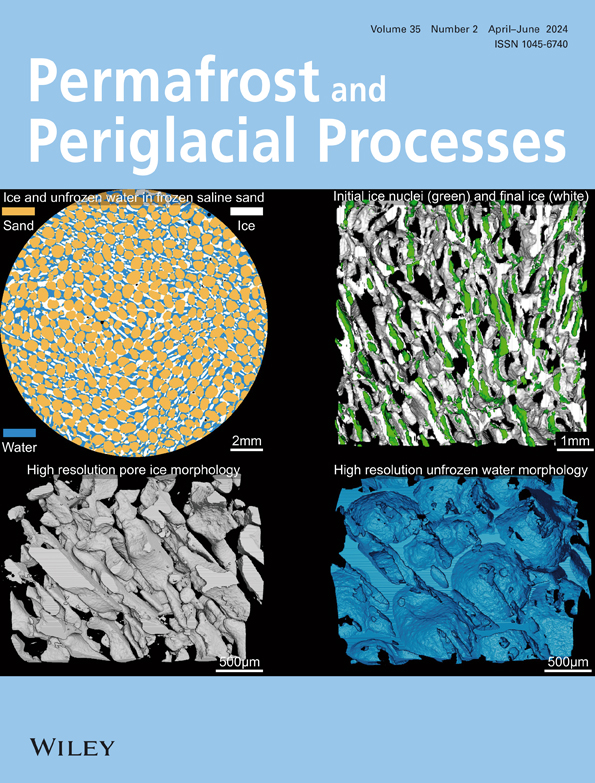长期缺氧变暖情景对冻土土壤微生物群落结构和功能潜力的影响
IF 3.3
3区 地球科学
Q2 GEOGRAPHY, PHYSICAL
引用次数: 7
摘要
受永久冻土(PF)影响的土壤在北极广泛分布,储存着全球约一半的土壤有机碳。通过PF变暖和季节性解冻层(活性层[AL])的加深,这种大的碳库变得容易被微生物分解。在这里,我们将温室气体(GHG)生产率测量与基于宏基因组的微生物分类和代谢潜力评估相结合,在缺氧条件下,在AL、PF过渡层和完整PF中恒温4°C培养5年前后。变暖导致所有层中CO2和CH4的快速初始释放,在较小程度上。在最初的脉冲之后,特别是在二氧化碳生产中,GHG生产率下降,条件变得更容易产甲烷。基于功能基因的分析表明,碳和氮循环基因减少,群落向不太稳定的有机物降解转变。这项研究揭示了在长期变暖的情况下,温室气体的产生量低但持续,这与主要代谢途径基因的相对丰度下降和碳水化合物活性酶类别增加相吻合。本文章由计算机程序翻译,如有差异,请以英文原文为准。
Effects of a long‐term anoxic warming scenario on microbial community structure and functional potential of permafrost‐affected soil
Permafrost (PF)‐affected soils are widespread in the Arctic and store about half the global soil organic carbon. This large carbon pool becomes vulnerable to microbial decomposition through PF warming and deepening of the seasonal thaw layer (active layer [AL]). Here we combined greenhouse gas (GHG) production rate measurements with a metagenome‐based assessment of the microbial taxonomic and metabolic potential before and after 5 years of incubation under anoxic conditions at a constant temperature of 4°C in the AL, PF transition layer, and intact PF. Warming led to a rapid initial release of CO2 and, to a lesser extent, CH4 in all layers. After the initial pulse, especially in CO2 production, GHG production rates declined and conditions became more methanogenic. Functional gene‐based analyses indicated a decrease in carbon‐ and nitrogen‐cycling genes and a community shift to the degradation of less‐labile organic matter. This study reveals low but continuous GHG production in long‐term warming scenarios, which coincides with a decrease in the relative abundance of major metabolic pathway genes and an increase in carbohydrate‐active enzyme classes.
求助全文
通过发布文献求助,成功后即可免费获取论文全文。
去求助
来源期刊
CiteScore
9.70
自引率
8.00%
发文量
43
审稿时长
>12 weeks
期刊介绍:
Permafrost and Periglacial Processes is an international journal dedicated to the rapid publication of scientific and technical papers concerned with earth surface cryogenic processes, landforms and sediments present in a variety of (Sub) Arctic, Antarctic and High Mountain environments. It provides an efficient vehicle of communication amongst those with an interest in the cold, non-glacial geosciences. The focus is on (1) original research based on geomorphological, hydrological, sedimentological, geotechnical and engineering aspects of these areas and (2) original research carried out upon relict features where the objective has been to reconstruct the nature of the processes and/or palaeoenvironments which gave rise to these features, as opposed to purely stratigraphical considerations. The journal also publishes short communications, reviews, discussions and book reviews. The high scientific standard, interdisciplinary character and worldwide representation of PPP are maintained by regional editorial support and a rigorous refereeing system.

 求助内容:
求助内容: 应助结果提醒方式:
应助结果提醒方式:


